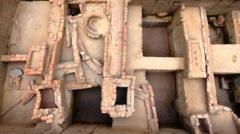The archaeological site in Keeladi, Tamil Nadu, has emerged as a pivotal point of contention in India, revealing a trove of ancient items that date back 2,500 years. Buried deep in the ground, experts have unearthed terracotta pots, brick structures, and even burial urns, reshaping our understanding of early Indian civilization. With significant findings such as elaborate water systems, historians argue that this site indicates the existence of a sophisticated urban society well before widely recognized historical narratives, often focused on northern India.
Located just 12km from Madurai and originally excavated by the Archaeological Survey of India in 2013, the site has since yielded more than 15,000 artefacts, including coins and pottery, displayed in a nearby museum. Archaeologists believe this discovery illustrates that the urban landscape of ancient India included vibrant southern centers, challenging the long-held notion that civilization largely developed in the north.
While the excitement over these discoveries resonates with local communities, the political ramifications are significant. Politicians have begun to posh links between the findings at Keeladi and the notable Indus Valley Civilization, suggesting a potential migration of people that could have contributed to southern urbanization. The ongoing debate about the Tamil Brahmi script’s origins and its age compared to the Ashokan script further complicates these discussions, with some experts advocating for more diligent research to substantiate claims.
However, tensions surrounding the site have risen, especially after controversies involving the transfer of ASI archaeologist Amarnath Ramakrishnan and disputes over the publication of excavation reports. The Tamil Nadu state government accuses the federal authorities of suppressing findings that highlight Tamil pride and history.
As discussions about Keeladi continue to unfold, it manifests not just a critical historical discovery but a broader conversation about regional identity and the complexities that shape present-day India. Through exhibits and community engagement at the Keeladi museum, visitors are invited to reconnect with a past that speaks to the interwoven narratives of culture and heritage in the subcontinent.























